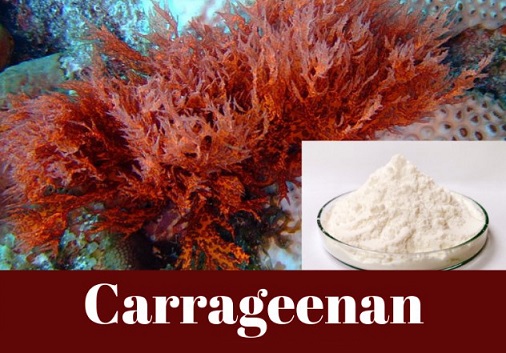Nikhil Prasad Fact checked by:Thailand Medical News Team Nov 11, 2024 5 months, 2 days, 9 hours ago
Medical News: Naproxen is a commonly used non-steroidal anti-inflammatory drug (NSAID) popular for relieving pain and inflammation. However, like many NSAIDs, it has a serious downside - it can cause significant gastrointestinal damage. Prolonged use of Naproxen often results in painful ulcers and other stomach and intestinal injuries. As the quest for natural and safe remedies continues, researchers have focused on marine algae, known for their bioactive compounds, to help mitigate the side effects of drugs like Naproxen. This
Medical News report sheds light on recent research exploring the protective qualities of a specific compound from the marine red alga Solieria filiformis, which grows along the Brazilian coast.
 Marine Alga Carrageenan Protects Against Naproxen Induced Gut Damage
Carrageenan: Nature's Remedy for Gut Protection
Marine Alga Carrageenan Protects Against Naproxen Induced Gut Damage
Carrageenan: Nature's Remedy for Gut Protection
Researchers from the Federal University of Pernambuco and the Federal University of Ceará, Brazil, have studied a polysaccharide called iota-carrageenan, extracted from Solieria filiformis, to evaluate its potential in preventing gastrointestinal damage. Carrageenans, particularly those from red algae, are known for their antioxidant and anti-inflammatory properties, making them valuable in both food and pharmaceutical industries. In this study, researchers observed that iota-carrageenan significantly reduced the macroscopic injuries caused by Naproxen.
Understanding the Study's Findings
The team conducted their experiments using rodents, focusing on the effectiveness of various doses of iota-carrageenan to mitigate Naproxen-induced injuries. Researchers administered different concentrations of iota-carrageenan to groups of rats and examined the effects on their stomach and small intestine tissue. Remarkably, the results showed that the alga compound, particularly at a 30 mg/kg dose, was highly effective in reducing inflammation, oxidative stress, and the size of the lesions caused by Naproxen.
How Iota-Carrageenan Reduces Oxidative Stress
Oxidative stress, caused by an imbalance between free radicals and antioxidants, plays a major role in gut damage. Naproxen exacerbates oxidative stress by increasing levels of harmful molecules in the gastrointestinal tract, leading to tissue damage and inflammation. Two critical markers were used in this study to gauge oxidative stress: non-protein sulfhydryl (NP-SH) levels and malondialdehyde (MDA) concentration. These biomarkers provide insight into the state of cellular health and oxidative stress in tissues.
After administering Naproxen, there was a marked increase in oxidative stress markers in the rats' gastric and intestinal tissues. However, treatment with iota-carrageenan from Solieria filiformis showed a substantial improvement in NP-SH levels and a reduction in MDA concentrations, demonstrating the compound's ability to counteract oxidative stress and reduce tissue damage.
Reducing Inflammation: A Key to Gastrointestinal Health
NSAIDs like Naproxen often
trigger a cascade of inflammation in the gut, recruiting inflammatory cells to affected areas. Researchers examined the enzyme myeloperoxidase (MPO), which serves as a marker for the presence of inflammatory cells. Naproxen alone led to a significant increase in MPO activity in the stomach and small intestine, indicating heightened inflammation. However, when iota-carrageenan was administered alongside Naproxen, the MPO levels decreased notably, suggesting that the algae-derived compound effectively reduced inflammation. The study also measured levels of inflammatory cytokines such as TNF-α and IL-1β, both of which are elevated during inflammatory responses in the gut. Iota-carrageenan showed significant reductions in these cytokines, further supporting its anti-inflammatory potential.
A Safer Option: No Changes in Gastric Acid or Motility
One of the concerns with any gastrointestinal treatment is whether it affects essential processes like gastric acid production and gut motility. The study found that iota-carrageenan did not alter these critical functions. Unlike other drugs that might reduce acid secretion as a protective mechanism, iota-carrageenan did not impact fluid volume, acidity, pH levels, or pepsin activity in the stomach. The compound’s protective effects were achieved without compromising the digestive process, which is particularly advantageous for a natural therapy. Additionally, gastric emptying and gastrointestinal transit times remained normal, meaning that iota-carrageenan does not interfere with food digestion or absorption.
Safety Confirmed: Iota-Carrageenan Shows No Toxicity
Safety is a critical aspect of any new treatment, especially for compounds intended for regular use. Researchers assessed potential toxic effects of iota-carrageenan through biochemical tests and histopathological analysis. They found no adverse changes in the rats’ body weight, organ health, or blood chemistry. Major organs like the heart, spleen, kidneys, liver, and lungs showed no damage or structural changes after treatment, indicating that iota-carrageenan is non-toxic. Additionally, serum markers, including liver enzymes, glucose, cholesterol, and kidney function indicators, were all within normal ranges, highlighting the compound’s safety for potential therapeutic use.
Conclusion
In summary, iota-carrageenan from the red alga Solieria filiformis demonstrates promising protective effects against the gastrointestinal damage often induced by Naproxen. By mitigating oxidative stress, reducing inflammation, and safeguarding gut integrity without disrupting normal digestion, this marine-derived polysaccharide may offer a natural alternative to reduce the harmful side effects associated with NSAIDs. Future research could explore the potential for iota-carrageenan in human applications, given its favorable safety profile and multi-functional properties. For those seeking alternatives in managing NSAID-induced gastrointestinal issues, marine-derived compounds such as iota-carrageenan may offer a fresh approach rooted in nature.
The study findings were published in the peer-reviewed journal: Biomedicines.
https://www.mdpi.com/2227-9059/12/11/2574
For the latest on Gut Health, keep on logging to Thailand
Medical News.
Read Also:
https://www.thailandmedical.news/news/breaking-latest-german-study-reinforces-past-research-showing-iota-carrageenan-ability-to-inhibit-replication-of-all-sars-cov-2-vocs-
https://www.thailandmedical.news/news/study-shows-potential-of-combining-iota-carrageenan-and-xylitol-as-a-potential-prophylactic-nasal-spray-for-covid-19
